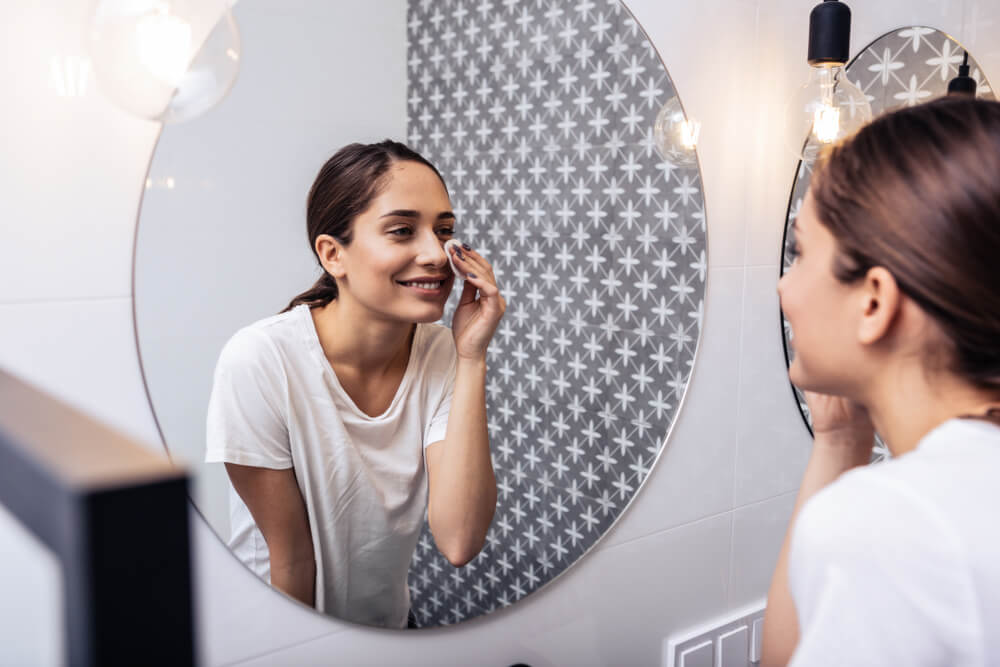Itchy, tight, flaky or simply reddened areas of skin – we are talking about sensitive skin. The question arises, at what point can the skin actually be classified as sensitive?
It is not uncommon for the skin to react with redness or flaking after prolonged exposure to the sun. However, sunburn should be differentiated from dry or sensitive skin. However, if stress, synthetic fragrances or overly spicy food cause such reactions, the skin should be treated gently. You can find out exactly how to do this here: Is your skin sensitive too?
Skin care products – less is more
Nowadays, the range of skincare and cosmetics on offer is very extensive. There are always free samples to test and the advertising all too often suggests that you need the advertised products.
The result is often over-care of the skin, also known as stewardess disease or perioral dermatitis. This is caused by excessive use of various skin care products or make-up. It is characterized by symptoms such as nodules or pustules. Although these are harmless, they burn or itch, are very unpleasant for those affected and are often accompanied by reddening of the skin.
In principle, a combination of psychological and environmental factors, genetic predisposition and the skin microbiome is always held responsible for skin diseases of this type. The cause lies in the countless microorganisms that are known to colonize our skin. These include bacteria, mites and yeasts. They form the skin’s protective layer to protect it from external, non-positive influences. If this balance is disturbed, e.g. by cosmetics, harmful bacteria or germs can penetrate the skin.
The problem: Very sensitive skin
And then there are sufferers for whom no cause can be identified, they simply have very sensitive skin. In this case too, it is so important to know the reason for the sensitivity. The easiest way to do this is to test carefully. A closer look at the skincare ritual and the ingredients used can provide the solution.
Even an allergic reaction to ingredients can be the reason for this. The best way to find out is to have this tested by a dermatologist. This way, ingredients that cause allergic reactions can easily be avoided in the future.
Or those affected are simply extremely sensitive and their skin reacts more quickly to external influences than others. In this case, it is the less irritating ingredients and the tip: less is more that can help.
In any case, it is a process of testing and trial and error. Not always easy for those affected, but the skin will thank you in the end.
Tips for sensitive skin
It is always crucial to preserve or restore the natural protective barrier and allow the skin to regenerate. This means recognizing the problem directly and eliminating the causes.
An expert should always be consulted in order to define the correct treatment. This is because it can often be confused with rosacea, neurodermatitis or acne.
Many experts advise against short-term suppression or postponement of symptoms with creams containing cortisone. Instead, less is more: keep your skincare routine to a minimum and avoid products with perfume, synthetic oils, mineral oils, preservatives, silicones or colorants. It is also important to use the right care products with soothing ingredients such as panthenol, aloe vera or witch hazel. Sensitive skin is often also dry skin, so care should be taken to stress the skin as little as possible, i.e. use a facial cleanser with a pH value similar to that of the skin and pay attention to moisturizing ingredients such as jojoba oil, coconut oil or shea butter.
However, oily skin can also be affected, in which case it is important to create a sufficient supply of moisture while keeping the oily content to a minimum, for example with the skinicer Repair Serum. Dermatologist Professor Dr. Kristian Reich also recommends the following: “An extract obtained from a microalgae with amazing antibacterial inhibitory effects and cell regenerative properties.”
Do you have any questions? Please send us an email to: info@ocean-pharma.de and if you would like to read more interesting tips, you can find them in our expert tips.
Image source: YAKOBCHUK VIACHESLAV/shutterstock.com






